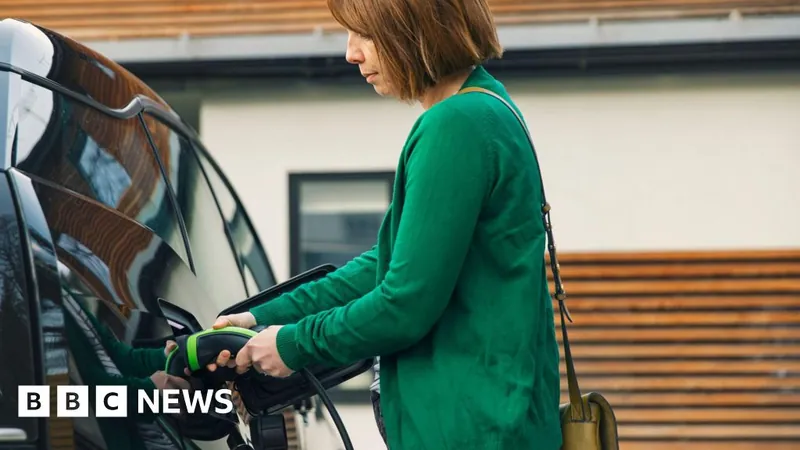
Electric Vehicle Backlash Intensifies: Ford Urges Government to Create Incentives for Electric Car Purchases
2024-11-27
Author: Wei
Ford's Urgent Call for Government Incentives
Ford UK has reached out to the government, urgently calling for incentives to stimulate the purchase of electric vehicles (EVs), as discontent within the automotive industry over ambitious sales targets begins to escalate. Lisa Brankin, Ford UK's chair and managing director, highlighted on a recent BBC interview the pressing need for governmental support, asserting that without robust consumer demand, any mandate requiring increased EV production and sales would be ineffective.
Broader Conflict Between Government and Automakers
This situation reflects a broader conflict between the government and automakers regarding the planned phase-out of new petrol and diesel vehicles over the next few years. The automotive industry is already facing upheaval, as evidenced by Stellantis, the owner of Vauxhall, which announced the closure of its Luton plant, jeopardizing 1,100 jobs—a direct response to the rapidly approaching EV targets set by the government. Business Secretary Jonathan Reynolds described this closure as a 'dark day for Luton,' echoing concerns about employment security in the sector.
Job Cuts Amidst Transition Pressures
In a concerning trend for the UK automotive industry, Ford has also announced it will cut 800 jobs over the next three years, attributing many of these job losses to the pressures of transitioning to electric vehicles amid mounting competition. Brankin emphasized the significant investments Ford has made in electrification, laying down over £350 million for EV production in the UK, and expressed that the current environment needs to support this transition effectively.
Historical Context of Job Losses
This isn’t the first time these companies have raised alarms about their future in the UK market. Ford previously closed its Bridgend factory in 2020, eliminating 1,644 jobs while citing pandemic impacts as one of the causes. Moreover, back in 2019, Vauxhall's former owner warned that Brexit posed threats to its Luton factory.
Government's Response and Labour Party Position
Reynolds has mentioned the inherited state of frustration from the previous government regarding this closure and insisted on conducting a 'fast track' consultation on the enforcement of current EV targets. Despite ongoing discussions, the Labour party has pledged its commitment to phasing out sales of new petrol and diesel vehicles by 2030, stating that the earlier target could lead to job losses and compelling companies to adjust their strategies significantly.
Sales Targets and Manufacturer Pressure
The government's framework requires automakers to ensure that 22% of their car sales and 10% of van sales are zero-emission vehicles this year, with fines of up to £15,000 for each car sold outside these limits. By 2025, these targets are set to escalate to 28% for cars and 16% for vans, placing a strain on manufacturers who argue that consumer demand has not kept pace with these ambitious goals.
Current EV Sales Trends
The automotive industry has seen a rise in EV sales, which accounted for one in five cars registered in October. However, insiders caution that this surge is largely attributed to aggressive discounts and subsidies needed to comply with sales targets. Reynolds conveyed his deep concerns about the current zero-emissions policies during a recent industry event, stating that the present system was not functional according to original intentions.
Potential Modifications to EV Sales Framework
Meeting with Automotive leaders, Reynolds and Transport Secretary Louise Haigh identified potential modifications to enhance the EV sales framework. Suggestions included facilitating credit transfers between car and van sales and granting benefits for British-made EVs sold abroad. The Society of Motor Manufacturers & Traders (SMMT) has urged immediate governmental intervention to secure the future of the automotive sector, warning that lackluster demand and strict quotas could devastate business viability and job security across the industry.
Concerns from Nissan
Meanwhile, Nissan, which manufactures EVs in Sunderland, has voiced its concern, stating that existing regulations are undermining the benefits of developing the UK automotive market and casting doubt on the future viability for jobs and investments in the sector.
Urgency for Government Support
As the automotive industry navigates the complexities of this transition, the call for strong governmental support and a practical approach to sales targets becomes increasingly urgent—an admission that the path to a greener future must also ensure the stability of the industry.



 Brasil (PT)
Brasil (PT)
 Canada (EN)
Canada (EN)
 Chile (ES)
Chile (ES)
 España (ES)
España (ES)
 France (FR)
France (FR)
 Hong Kong (EN)
Hong Kong (EN)
 Italia (IT)
Italia (IT)
 日本 (JA)
日本 (JA)
 Magyarország (HU)
Magyarország (HU)
 Norge (NO)
Norge (NO)
 Polska (PL)
Polska (PL)
 Schweiz (DE)
Schweiz (DE)
 Singapore (EN)
Singapore (EN)
 Sverige (SV)
Sverige (SV)
 Suomi (FI)
Suomi (FI)
 Türkiye (TR)
Türkiye (TR)